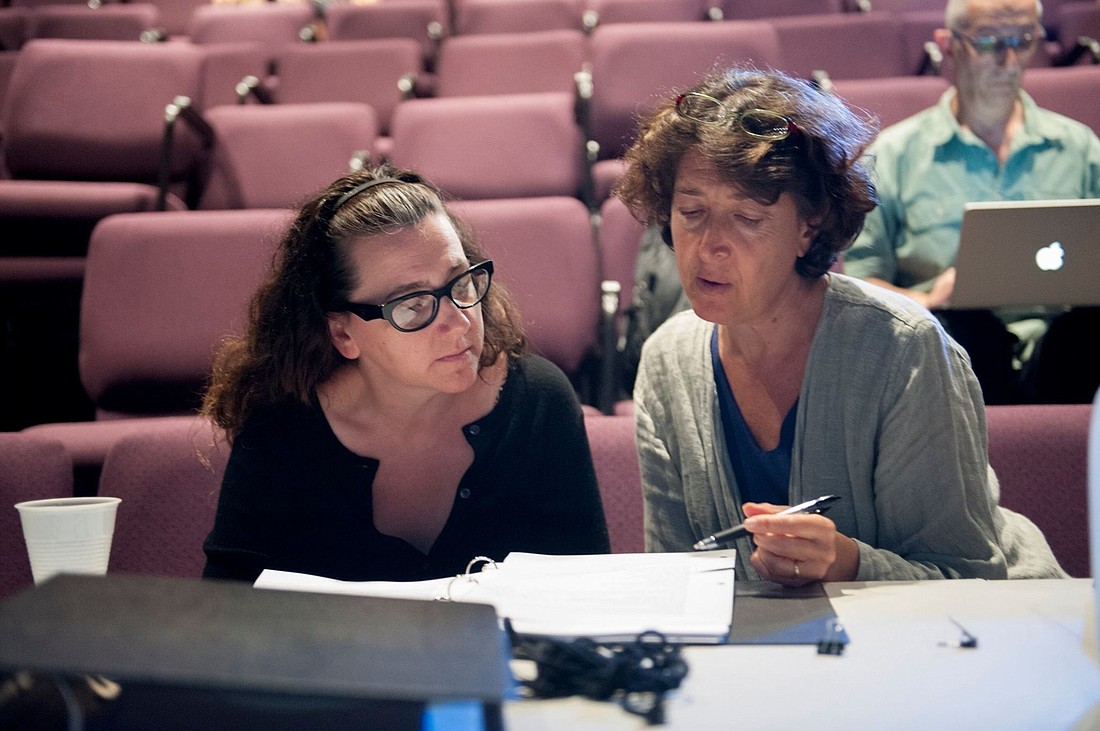- November 23, 2024
-
-
Loading

Loading

Writing, like all art forms, is a process. And crafting a story that is written to be told by other people is a process best approached with a team.
The National New Play Network’s Women in Playwriting Festival does just that. From April 23-May 10, Florida Studio Theatre is playing host to NNPN for a series of readings of new works by female playwrights. The experience is more than just a chance for writers to see their work performed, however. It’s a chance to workshop their piece with FST actors eager to help mold an untold story.
Philadelphia-based Jacqueline Goldfinger is one such playwright, and she was already working on the first draft of her play, “Babel,” at FST when she received a grant from NNPN to be a part of the festival.
“I originally submitted to their (FST’s) literary office blind, and that play wasn’t quite up their alley, but they loved my writing so they asked me to send something else,’” she says. “There’s nowhere better to develop new work than FST.”
“Babel” was what FST was looking for. Goldfinger was given a two-week residency at the theater but wrote the first section of the play at home so they’d have something to work on when she got to Sarasota.
When it came time to workshop the piece, actors spent the morning reading it and FST Associate Artist/Literary Manager Catherine Randazzo offered feedback. In the afternoon, Goldfinger headed back to the apartment FST had set her up with and revised until she had new pages ready to bring in the next morning.
“It’s the most classically American way to develop a play,” Goldfinger says. “To be able to go in and work with an acting company for part of the day and revise the rest of the day is a golden opportunity.”
Sarah Bierstock, whose play “Honor Killing” made its world premiere at FST last season, had a different journey to the festival — but she too sings the praises of its workshopping process.
“They reached out to me because they were looking to put females voices forward and wanted to support another piece of mine,” she says. “They got behind me and my writing and that’s why it’s happening.”
The first draft of of Bierstock’s “Mothers and Daughters” was finished in 2015, but she didn’t touch it for six months while she was working on getting “Honor Killing” ready for the stage. Her creativity is at its best when she’s working on one play at a time, she says.
About a year ago, she picked it back up when FST asked to see some of her other work. The theater company told her it had potential, so Bierstock was given a workshop in October that she says helped grow the work exponentially.
“I would leave and write madly at night and then ask people to read it again and perhaps dissect certain scenes and really dive in to learn what the play was about,” Bierstock says. “And to learn what’s not working … if actors aren’t understanding something then the writing needs to be addressed.”
She also was offered one reading with an audience talk back afterwards, and that feedback combined with what she had already learned from her five days of workshops was so helpful, she ended up adding a new character (from whose perspective the story is told) and changing the pivotal event that “Mothers and Daughters” is based around.
“The root of what it’s about became more crystalized,” she says. “It’s a play about family and women and the depth and expense they’re willing to go for each other.”
Goldfinger’s “Babel” also deals with motherhood, but in a completely different light.
“Babel” takes place in a version of the near future in which parents can learn within a few weeks of conception what traits their child will have and how they will likely act. These predictions determine whether the parents are given a PRE certification, essentially deeming whether the child will be a “good” person.
The play is centered around the essential question: What should parents do with these test results?
Goldfinger looks forward to seeing how the festival audience will react.
“The best feedback ... is watching and seeing where they lean forward and are engaged,” she says. “When do they laugh, and where should they laugh but they don’t.”
She also looks forward to connecting with fellow female playwrights (the other two present will be Lia Romeo and Minita Gandhi), who she finds to be more open to sharing thoughts and ideas with other writers.
“Often it’s quite isolating. We write alone in a room, so having the opportunity to work on a new play but also talk to new playwrights about their process is just a wonderful opportunity,” she says. “Right now we’re in a golden age of American playwriting, and there’s not enough production slots for all the wonderful writers out there.”